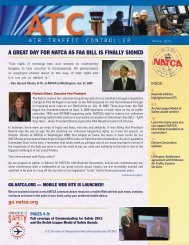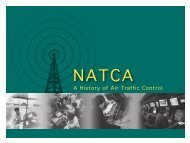Against the Wind - National Air Traffic Controllers Association
Against the Wind - National Air Traffic Controllers Association
Against the Wind - National Air Traffic Controllers Association
You also want an ePaper? Increase the reach of your titles
YUMPU automatically turns print PDFs into web optimized ePapers that Google loves.
force, were fired. Most appealed <strong>the</strong>ir dismissal to <strong>the</strong><br />
Merit Systems Protection Board, but only 440 were<br />
reinstated during <strong>the</strong> next two-and-a-half years. 7<br />
When <strong>the</strong> dust finally settled, more than 11,000<br />
workers no longer had a career in air traffic control.<br />
The Federal Labor Relations Authority decertified<br />
<strong>the</strong> 13-year-old PATCO on October 17. For <strong>the</strong><br />
first time, a union representing U.S. government<br />
workers had been stripped of its legal standing.<br />
On <strong>the</strong> last day of 1981, Poli resigned, persuaded<br />
by o<strong>the</strong>r board members that <strong>the</strong> union could<br />
not move forward until he stepped aside. According<br />
to PATCO members who kept in touch, Poli later ran<br />
several car dealerships along <strong>the</strong> East Coast. Executive<br />
Vice President Robert Meyer also quit. Central<br />
Region Vice President Gary Eads and Western Region<br />
VP Domenic Torchia were elected president and vice<br />
3<br />
Aug.<br />
1. Fuerbringer, Jonathan. 1981. Militant controller chief: Robert Edmond Poli.<br />
The New York Times. 4 August, late city final edition.<br />
2. Much of <strong>the</strong> material about <strong>the</strong> January 1980 PATCO meeting is based on<br />
interviews with John Leyden and George Kerr in September and November<br />
2001, respectively.<br />
3. Garonzik, Joseph. 1986. Aviation’s Indispensable Partner Turns 50. U.S. Department<br />
of Transportation.<br />
4. Related by Domenic Torchia during an interview in July 2001.<br />
5. 1981. <strong>Air</strong> traffic controllers set a June 22 strike deadline. The New York Times.<br />
24 May.<br />
6. PATCO figures.<br />
7. Transportation Department figures.<br />
The walkout starts at 7 a.m. Eastern time. Nearly 13,000 controllers—<br />
about 79 percent of <strong>the</strong> work force—honor <strong>the</strong> picket line. President Reagan<br />
announces <strong>the</strong> controllers must return to <strong>the</strong>ir jobs within forty-eight<br />
president, respectively.<br />
They took over a mortally wounded organization.<br />
Stripped of its charter and facing claims of<br />
about $40 million, <strong>the</strong> union filed for bankruptcy on<br />
July 2, 1982. “It is over for PATCO,” Eads told reporters.<br />
“The union is gone.” 8<br />
8. Shifrin, Carole. 1982. PATCO goes bankrupt 11 months after strike. The<br />
Washington Post. 3 July, final edition.<br />
Chapter 1: ATC Comes of Age<br />
hours or <strong>the</strong>y’ll be fired. Supervisors, staff specialists, and military controllers<br />
step in to help handle traffic. Even so, airlines cancel more than 6,000<br />
flights. A federal court impounds PATCO’s $3.5 million strike fund.<br />
29




